Don't wanna be here? Send us removal request.
Text
I won't disagree that I found this show to be confusing, too, but I'm sure that if we had watched the episodes in between the assigned ones, things would've been at least a little bit clearer. About what you said about the internet being a man-made constructs that, therefore, has artificial restrictions imposed by humans, I think the last assigned episode we watched touches upon that when Lain poses that idea to Eiri in order to defeat him. In some regard, I think she was trying to re-empower humans by reminding the equivalent of a manifestation of a technological god that his power is ultimately still limited to the discretion of humans. Also, best of luck on your exams, too!
04/24
Serial Experiments Lain (EP 1, 4, 7, 12)
I thought the show was interesting, but I don't know if I liked it. I was in a bad mood when I watched it, and I still am, so maybe I didn't see things right.
One thing I did noticed throughout the show were people's eyes. I don't know if it's artistic styling like if the animators/artist got lazy or intentional, but some eyes were very un-human. Lain's is a good example. Her pupils were super constricted and the lines that point towards or away from the pupils made her eyes seem fake, and not because it's a fiction, but it just made her seem unreal. Even in episode 1 before anything began, she did not look normal, but I guess that might have foreshadowed her origins.
The Wired scenes reminds me of 2000s movies that featured the Internet with the grainy screen qualities and the deep dramatic computer voices at the introduction scenes in each episode.
Also I wanted to point out that ominous shadow in Lain's neighborhood street. I thought it was ominous because it looked like a shadow from the houses or electric pole but the sahdign wasn't a dull grey but it had things in it that supposed to be either a void or a pool of dark things.
Anyway, I have no clue what went on in Lain's mind, but I know she's supposed to have traveled between the Wired and the real world. When she explains things, I don't know where or how she came up with the stuff. It almost sounds like she figured it out, but it didn't say how.
I am curious about what is said and found about the Wired. I know it basically refers to the Internet and its infinite possibilities. Even now we are still finding new ways to use it and open new avenues within the Internet for people to discover. But like computers, the Internet is a man-made construct. The things it cannot do are what we allow or have not found.
But that's the point of the Wired. It suggests that what people don't know already exists, you just need to find it. Instead of treating it as a manmade construct, it is an independent dimension that can only be accessed by devices (phones and computers, or the anime calls them Navis). And a Navi doesn't connect you to some location on your selected Internet. It connects you to your Wired self. Or at least for Lain, it did. I don't know what other people do since they are supposed to be "applications." Are they applications from the Wired that are opened as humans in the real world or the other way around?
I also don't know if it ever explained what the Knights were, or how the Wired or Lain is connected to the suicides, like the very first one at the beginning of the show.

I know the episode skipping probably skewed my opinion of the show, but I don't really have much of an opinion for this show. The confusion probably gives it complexity, but even in episode 12 I am still not sure what anything means.
-04/23/24
Last post of JPT3702. Thank you to everyone who reblogged my posts. I didn't give many mind-blowing posts, but I hope everyone enjoyed it regardless. I had a good time reblogging everyone else's posts and hearing other people's thoughts. Good luck with exams and have a good semester!
3 notes
·
View notes
Text
Post for 4/24
I’m really glad that we got to watch Serial Experiments Lain for this semester’s last class. It was a cool show! The anime’s art style is unique and I think the bleak backgrounds really added to the atmosphere. It’s very minimalist, but it works wonders for this show.
I was sometimes confused by random, short sequences that the plot didn’t really explain. For example, there was a guy who was chased around and murdered (?) by a little girl, but I don’t think the show ever clarified who either of them were. Then, some guy killed (?) that girl in a game called Phantoma in the Wired using his handgun (no pun intended). Also, where is Mika? Can someone check up on her?
However, the moments when I could comprehend the show were good. I wonder if the version of Lain that is confident is a reference to how the shield of anonymity makes people lose their expressional filter when they’re talking on the internet. Also, it was kind of annoying to see Lain’s family basically neglect her well-being, except for her father to some extent. I did end up watching the very last episode of the anime, too, and it was nice to see her father talking to her in limbo.
My favorite episode was the last one we were assigned, where Arisu reminds Lain that she is human and stops Eiri’s plan from coming to fruition. It was wholesome to see Lain trying to comfort Arisu and vice versa, despite Lain letting her see man-made horrors beyond her comprehension, going so far as to erase herself from everyone’s memories to stop their suffering. It felt like Lain was more human than she ever was during those moments. Actually, I think they intentionally made it ambiguous whether Lain is a human, homunculus, program, or a God. In any case, it was awesome to see her putting Eiri, a false God, in his place. By all means, own that fraud!

Image of Lain from https://pen-online.com/culture/god-is-in-the-wired-serial-experiments-lain/.
5 notes
·
View notes
Text
It's interesting that you brought up Freudian ideology and I never really thought about the movie from that perspective. I guess that theory applies most to Konakawa because it is reflected in his dreams that he struggles to come to terms with his past. I'm not sure if seeing a weird marching band of toys is a repressed desire of most people (but hey, who knows?) but maybe that's just an external influence caused by the DC Mini or by the chairman. Also, yeah, I agree that Dr. Chiba could've been a bit more gentle with Tokita but I guess the show was trying to portray him as a stubborn guy or something.
4/22 Paprika
Oh boy and I though Perfect Blue was confusing...
I do wanna applaud the director for doing a great job blurring the point between dream and reality to the extent he did because a whole driving plot point is being in other people's dreams BUT maybe I just lack the aptitude for deeper psychological themes because I was so incredibly lost.
With Perfect Blue you do get the same sort of dazed questioning what's going on feeling but it's not so jarring to where you struggle to understand like I felt this movie was.
If you subscribe to the Freudian ideology where dreams are repressed wishes that reveal more about a person, the idea of a device being developed that allows you to see someone else's dreams as a way of helping them could be groundbreaking however as was shown in this I feel the kind of invasiveness of this could only lead to bigger consequences in the future.
I didn't really like the way Dr. Chiba was fat shaming Tokita and also wasn't a huge fan of how she kept blaming him for EVERYTHING. Furthermore, I found the scene where Paprika is like ripped open to reveal Dr. Chiba on the inside- was really oddly sexual and uncomfy. In a lot of the odd dream sequences there were dolls or other child-like items so having these random groping scenes or someone getting shot repeatedly was a weird juxtaposition. As for like deeper analyzable themes I'm struggling a bit on that so I'm looking forward to hearing others thoughts in class.
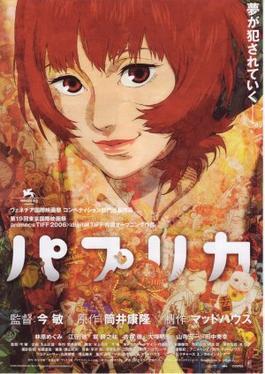
4 notes
·
View notes
Text
Post for 4/22
Paprika felt like a fever dream to watch, no pun intended. I can definitely see how the movie inspired Inception. I did watch Inception a while back and I feel like it was a bit more complex than Paprika since there were multiple layers of shared dreams, while in Paprika, there’s pretty much one big dream and it can intersect between multiple people, but I don’t think it’s meant to be multilayered (dream within a dream), to my understanding. Paprika’s surrealism and altered realities also reminded me of Mima’s delusions in Perfect Blue. Anyway, the animation quality and surrealism were really cool but I’m not sure if I got anything analyzable out of the movie, to be honest. I’m open to hearing what themes other people got out of it, though.
I guess one thing that was slightly confusing was whether Paprika and Dr. Chiba were actually the same person. Throughout the movie, it seemed like Paprika was a persona that Dr. Chiba imagined herself as when she dreamed. However, at the very end, within the big dream, it seemed like Paprika was able to separate herself from Dr. Chiba and became an independent entity with her own thoughts. And then Paprika, naturally, as one normally does, ate the bald chairman and saved the world from the big dream. I’m betting that someone during class is going to propose the theory that Paprika is a reincarnation of Jesus who died to save everyone.
It was kind of weird how multiple men wanted to be romantically involved with Paprika at one point or another. Dr. Konakawa wanted to kiss Paprika in his dream after his performance on stage, which was actually Shima in real life? Then, Osanai… I don’t even know what he was doing to her. That scene was wild.
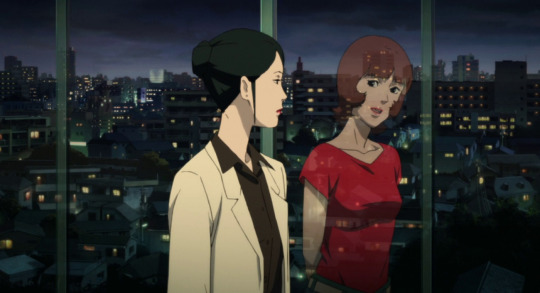
Image of Paprika from https://anime-ashoka.medium.com/paprika-or-how-i-learned-to-stop-worrying-and-reject-gender-binaries-f981ff915c55.
2 notes
·
View notes
Text
I agree that Squealer was put in a morally gray situation. He wanted the best for his colony so he decided to make some morally questionable choices, such as taking the queen captive and declaring war against the humans. In doing so, he objectified his citizens as expendable soldiers who died "for the greater good." You brought up a good point that the show could be making some commentary regarding the power dynamics within empires in Japanese history, too.
Shin Sekai Yori (15, 21, 24, 25)
In episode 15, we can see Squealer and his species worry about becoming extinct and therefore try to exploit the queen. They knew they were smart and believed that they deserve some power, yet the queen had so much and ruled over them unfavorably. I feel like this represents governments/powers throughout history: the government exploits or neglects its citizens and, therefore, the citizens retaliate, protest, etc. at the power's expense. The citizens come together to build power and make changes to the government/power. Squealer and his species worked together, forming a union, and tried to negotiate, yet they ended up trapping her and still exploit her for the benefit of the colony. This is similar to when the newly formed government reduces the power of the leader, making them instead a public figure (kind of like the president or prime minister). Then we see things like war prisoners, enslavement, imperialism/colonialism in episode 21, which we see in history during an overthrow of rule as well. In the last episode, the Squealer talks about how change is necessary, which I do think is true, but that the sacrifices would have been worth it if they had won, which I disagree with: in the end, people lost their lives. War and violence are the problem (I can see why Squealer thought they needed to resort to it, especially when they tried to propose equal rights, but to continually hurt the Queen and other species? That does not seem very moral). In the end, it is quite a morally grey area when you consider all things, though.
I think there is also commentary on patriarchy. The Robber Fly colony thinks that the queen's only job should be childbirth, while the "smart" ones should have the power. The queens are stuck inside (domestic duties, trapped in the house) while the men (I think) are free to roam and rule. This also reminds me of Japanese history. There were queens with power an extremely long time ago in Japan, like Queen Himiko, that people at first accepted as ruler; however, men soon believed they deserved the power, labeling women that ruled as evil (people believed that Queen Himiko had magical powers that she used for evil purposes as well), resulting in men ruling Japan. Then, they use violence, blaming the Goat Moths for shooting an arrow when they used violence first. This represents the common opinion that men often resort to violence more compared to women, like starting something as small as fights or as big as war.
Now, something that I find quite disturbing is how kids ended up having a child?! Like I think they are 14? Definitely an interesting plot by the storywriter - I wonder what the idea was behind that?
I think that overall, this anime is a commentary on power, whether its a ruler, and man and woman, magical powers, or the responsibility that comes with it.
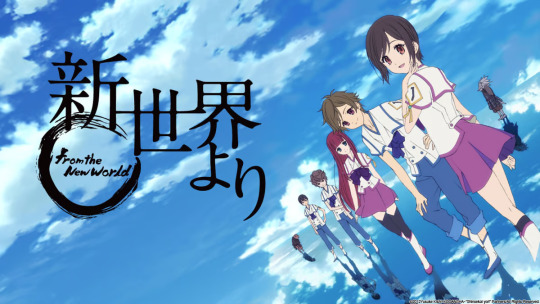
8 notes
·
View notes
Text
Post for 4/19
It was a bit difficult to connect today's Shin Sekai Yori episodes to contemporary Japanese themes, but at least I was somewhat able to keep up with the plot. I don’t have the full context for Yakomaru’s background since we skipped most of the episodes, but I feel like his punishment was unnecessarily merciless. I felt bad for him when he was laughed at by the humans in the court and, of course, when his organs bursted out from unendurable pain. I feel like he could’ve taken a more peaceful approach to physically separating the rats from humanity’s oppression (maybe they could’ve migrated to somewhere else), but other than that, I think he was valid in terms of not wanting to leave the fragile lives of their entire colony in the hands of humans with powers that could wipe them out at any instant. Who would willingly want to be put in a situation like that? Also, Satoru was criticizing Yakomaru for nailing the rat queen’s body down, but what else was he supposed to do – let the queen continue her rampage and kill everyone in the colony? I feel like some of his actions were justified and that Saki was the only person who realized that for some reason.
Also, I’m disappointed that the show made it seem like Saki and Satoru were going to save the ogre (Maria and Mamoru’s child) by making the ogre realize that she was human, too, but they just ended up making the ogre kill herself in the end. They really had to sacrifice Kiroumaru for it, too. I thought there was going to be some message about having empathy and humanizing criminals who didn’t know any better, especially because she was literally just a child, but nope – let’s kill her off instead of giving her any chance for redemption, I guess!

Image of Kiroumaru from https://shinsekaiyori.fandom.com/wiki/Kiroumaru/Gallery.
2 notes
·
View notes
Text
I do feel like they do a massive lore-dump on the viewer with the fake Minoshiro episode. I usually watch shows on 2x speed but I had to slow this one down quite a few times because there was so much to process. I couldn't imagine myself comprehending the show if I were to watch it while folding laundry, haha. And yeah, I'm hoping that we can clarify the themes that this show is trying to display when we discuss it in class, because it was a bit difficult for me to get a good grasp on, too.
Shin Sekai Yori Blog Post 4/17
Not gonna lie, I didn’t really enjoy Shin Sekai Yori. I don’t think it was a bad anime, I just think I personally don’t have the brain capacity for it. So much information is thrown at you and I made the mistake of trying to fold laundry and watch the show at the same time, LOL. From what I gathered, we follow the young Saki Watanabe as she finally gains her powers and moves on to an academy meant for people who possess psychic abilities. She joins group 1, with the members being Reiko, Satoru, Maria, Mamoru, and Shun.
I think the episode that stuck out most to me was episode 4. They encounter a thing called the Minoshiro, which reveals the answer to any question they ask. It ends up being a fake Minoshiro, in which a guy comes to destroy for them. However, they learn a lot of useful and saddening information from them. They learn about society from the Dark Ages and their own society, and the creation of Ogres and Karmic beings. They also learn information on the population of those with PK, such as only 0.3% of the population obtain PK and there were movements to eradicate them, some even leading to war. It made me feel sorry for these kids, they are absorbing so much information at such a young age, and given a lot of responsibility for holding this type of power. A lot is to be said about the development and destruction of certain societies and eras. It went from embracing PK powers to suppressing anyone who has them, leading to what they called the Dark Ages. Then it progresses back into acceptance or practice of PK powers into the present time in this anime. Episode 4 contained a big chunk of the history of this universe, and I’m still trying to wrap my head around it. I feel like this show tried to implement many themes but I could not really catch myself developing any of my own thoughts. I think our next round of episodes will help me get a clearer idea of the message of this anime, but right now I feel like my mind is convoluted with the huge information dumps, especially in episode 4. One thing I did notice is the question of what it means to be human and to be treated as human. This goes for the rat people, Queerats, and all other beings in this universe. Even the existence as humans obtaining PK is called into question. So what makes one human, and what is the ethics of treating one as one?
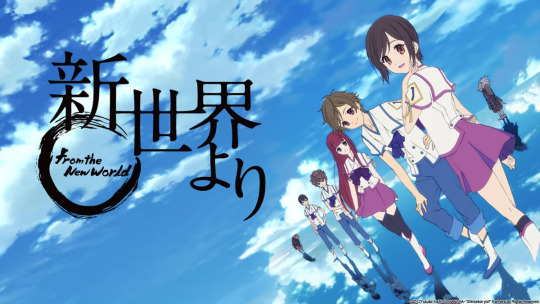
5 notes
·
View notes
Text
Post for 4/17
“Wild Child” was an unsettling read. I was curious about the Kobe serial killing incident, so I looked it up, and it was every bit as disturbing as I expected. I took a forensics class in high school and we explored a myriad of serial killer cases, so hearing about Boy A’s case really brought me back to those times.
I like horror stuff so Shin Sekai Yori was an interesting watch! It was a bit confusing with all of the lore and episode skipping, but I think I got the gist of it. I’m guessing that the first PK user who committed crimes named Boy A was an allusion to the real Boy A that was mentioned in “Wild Child.” I’m wondering what the Death of Shame that prevented people from stopping Boy A could be an allusion to. Maybe it represents the former Japanese law in place that prevented minors under 17 from being incarcerated? Or maybe it was just empathy that prevented people from wanting to hurt minors? Also, regarding kids who become ogres such as the kid named K, I think the anime did a good job of showing what leads them to doing horrible things – not that their actions are justified, but it’s hard to overlook the probability that many of those kids grew up as victims in some regard. The anime portrayed these kids as neglected, vulnerable, and deeply afraid of the people around them, which I feel is pretty realistic. Of course, the Education Committee uses a twisted approach of destroying them before they have actually done anything (which reminds me of Psycho-Pass). Right now, I sort of get what message they’re trying to tell for ogres with Larman-Krogeus Syndrome, but Karmic Demons with Hashimoto-Applebaum Syndrome are still a mystery to me. I look forward to what we come up with in class.

Image of Saki from https://www.crunchyroll.com/watch/GY5VJKWPY/torchlight-in-the-darkness.
4 notes
·
View notes
Text
I wasn't entirely sure where the show was going when they revealed that the NEETs had supposedly been destroyed, although the message became clearer when they were suddenly brought back to collaborate. I do wish they had shown a bit more of what the NEETs could accomplish as a collective, though, to really drive home their capabilities. Perhaps this is explored more in the sequel movies.
4/15/24
Today I got to watch four more episodes of Eden of the East including the series finale. Personally, I felt that the anime ending was a little abrupt, I don't know if there were problems with the studio or the creator when this was being finished, but it sort of felt like the original Bleach manga ending where there were tons of loose ends and a lackluster finish.
I did however enjoy learning and interpreting some of the messages in this anime. I feel that the way they were implemented was clever. For instance, one of the messages focused on arguing the idea of downsizing Japan by getting rid of the useless and those who wouldn't give up their own rights to better the overall nation. I felt that this message was very cleverly displayed throughout the anime. After all, one group of these useless people who they wanted to get rid of, the NEETS, ended up being instrumental showing ingenuity and quick thinking in a stressful situation when they collaborated as a group to intercept the missiles that were bearing down on them and the mall.
This directly confronts and contradicts some of the extremists in modern day Japan who believe that Japan has to downsize to only those who would put it back to its Imperial era roots, as they believe this was the best version of Japan. I touched on this in my last paper, which was focused on Zipang and its messages against the extremist values of Imperial Japan as I believe that while it is a minority, it is still a dangerous minority, and I believe that addressing it through this was a smart way to disprove their ideas. Overall, I feel that Eden of the East was a good watch with a solid overall message.
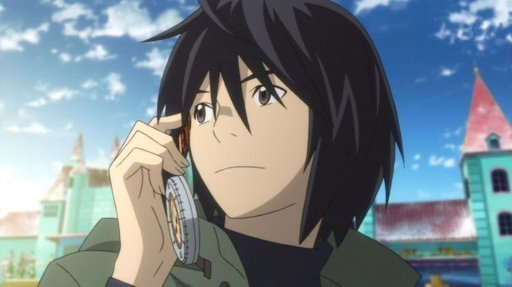
2 notes
·
View notes
Text
Post for 4/15
The last episode of Eden of the East felt like it was something straight out of an action movie. The part where all of the NEETs worked together to plan out how to intercept the incoming missiles within seconds is like a visualization of people on the internet using Reddit to track down a piece of lost media, or something along those lines. In general, the appearance of the naked, angry NEETs were really funny to see. Something about the imagery of 20,000 of them simultaneously yelling and jumping out of shipping containers was so surreal. The scene where they immediately dispersed to the sides of the room when women were passing through, like vampires to garlic, was also really funny. “Don’t worry, they’re probably only interested in 2D” completely caught me off guard, too.
I don’t think I’m the only one who didn’t expect the ending to be so abrupt. I thought that I had watched the wrong episode at first but it really turned out to be the last one. I searched it up and apparently there’s a couple of sequel movies that follow the anime series. I kind of wish we were assigned to watch those for class because I feel like there are still a lot of loose ends that remain. What does Takizawa intend to do as the King of Japan? Who is the real Supporter? Is Ato still out there? There’s still so much to be explained.
Something that relates to our previous in-class discussions was Itazu’s belief that conspiracies emerge when a nation is weak. When there isn’t a physical higher power that enacts power onto the common people, those people start to make things up to fill in that gap, such as religion or conspiracies. Perhaps this is why Takizawa wants to become the King of Japan so that people aren’t misled by falsehoods any longer?
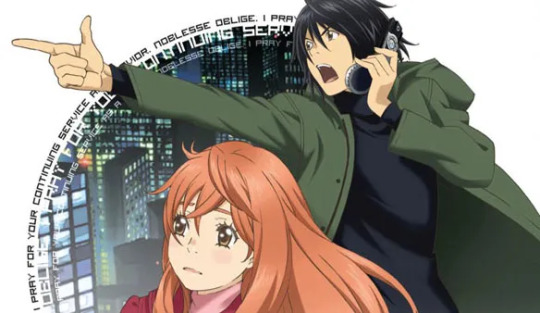
Image from https://www.indiewire.com/criticism/culture/anime-review-eden-of-the-east-the-premium-edition-122333/.
4 notes
·
View notes
Text
I'm really glad that they hired actual American voice actors to voice Americans. You wouldn't think it's a big deal, but just in doing so, Eden of the East is already doing so much better than a lot of other anime who try to portray Americans. I'm having some trouble connecting the situation with the missile attacks to historical events, too, so I'm hoping that we can clarify the allusions in class.
JVC Post #33
Eden of the East

THIS WAS SO COOL. This is the best representation of America in anime that I've ever seen. It doesn't just feel like a weird reflection of America, it feels genuine. Even down to the squirrels and crows. The opening scene was insane too, really good hook into the show. I didn't think I'd laugh so hard when she asked him if he as cold and he was just like "yeah". Also obviously happy about the great black characters and American characters that actually have American voice actors. Little things like that help sell the setting. It's almost kind of surreal, since I'm not used to such relatively accurate portrayal of America in anime. Seeing anime tropes and acting in an unmistakably American setting is a strange experience. Also, I said "taxi driver?" as soon as Akira did the pose, so I ended up saying it at the same time as him, which was also really funny.
I do struggle to find what to talk about in this post themes-wise unfortunately. The show is really interesting, and it's clear there's some commentary on terrorism with the missile attacks and whatnot, but I can't find anything significant to mention. I look forward to hearing about what people think in class though.
"Work Culture" by Sugimoto in The Cambridge Guide to Modern Japanese Culture was also a good read. It's really something to see how culture is molded and put in place and kept there by different facets of society. It's a struggle everywhere, and it really can especially be seen in work culture. In Japan's case it seems like the changes such as deregulation that came with economic restructuring postwar had a lot of effect on the development of their present work culture, though it's been changing for the better in recent years.
3 notes
·
View notes
Text
Post for 4/12
Eden of the East was an interesting watch. It was kind of bizarre to hear people speaking non-broken English in anime and even more bizarre that the Americans understood Japanese with no issue (but weirdly wholesome). I’m actually glad that they laid out the rules of the game played by the Selecao in one of the first episodes because it probably would’ve taken me a while to figure it out had they not explained it in a straightforward way. For some reason, I can’t take this anime too seriously because it feels a bit unrealistic. Morimi just trusts a stranger who flashed her, the police view their jobs as a joke, people aren’t taking any big measures to investigate or stop the Selecao, and the Selecao are so far above the law in every way possible with no meaningful backlash or regulation.
Regarding “Work Culture” by Mouer, it was disappointing yet not surprising to learn that postwar conservatives dismissed leftist activists, who demanded a raise in minimum wage and guaranteed human rights, as foreign individualists who did not belong in a collectivist Japan. Honestly, that is really one of the weakest excuses that can be thought of, and what makes it crazier is that the conservatives said this AFTER the war and AFTER everyone realized the dangers that collective, blind faith in their government’s right-wing propaganda could bring. I don’t know how anyone would actually believe them, especially in regards to something as important as giving people decent lives. It’s clear that their motive was to save money on both distributing reasonable salaries and implementing safety guidelines/enforcement, which are notoriously expensive to implement in many cases. What exactly was their argument? “Because we’re a group, you must be honored to earn less money (and effectively save us money but ignore that part) and be prepared to risk your life at all times!” Who would fall for this, genuinely?
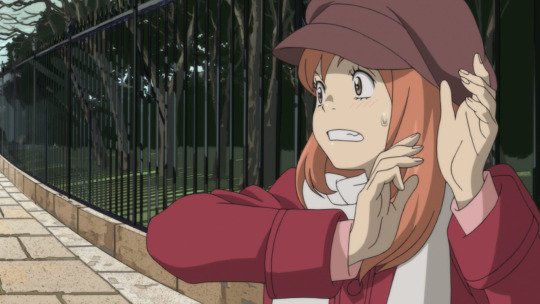
Image of Morimi from https://www.amazon.co.uk/Eden-East-Season-1/dp/B0CH38SYBW.
8 notes
·
View notes
Text
Looks like I'm not alone in having a bit of difficulty distinguishing the characters! It was definitely revealing to see how the Mirai crew reacted when their ship was directly attacked by the kamikaze bombers. We see a generational difference in attitudes where one generation thinks that it's an honor to sacrifice their lives for "the greater good" and another has already moved far past that attitude. I actually didn't know that "Beijing" was close to "Peking." Many thanks for allowing me to add another excellent fun fact to my repertoire.
04/10
Zipang P2
It was very hard to piece together a thought process considering the jump for today's assigned episodes, but I will do my best here. Also, I cannot distinguish the characters, despite the art style differences (Tin-Tin eyes vs anime eyes).
After the Mirai was attacked by American planes, the leader's resolve was clearly broken. You can't blame his mistakes on him because pretty much anyone today has never experienced WWII. While there were wars, none were World Wars. Japan after WWII had not experienced true battles, so the scare tactic to frighten with minimal violence was not enough. Even though I'm sure they knew about Japanese kamikazes and suicide missions, I don't think they connected the soldiers of this era had the "die trying" mindset.
Also, we got to understand what the title means to the anime/manga. While yesterday's presenter told the origins of the word "Zipang," hearing it from the characters was just as important. "Zipang" is "Japan" but the original name before it became Japan. Sort of like how "Peking" (if you are unfamiliar, perhaps Chinese food lovers can tell you about the importance and cultural significance of Peking roasted duck.) referred to the capital of China before it became "Beijing." While Western languages do not usually pronounce the words accurately (every language pronounces foreign words a little off, so it's kind of, not really, fair; looking at you, "bao-buns", "lo mein-noodles", "matcha-tea", etc.), how the show interprets Zipang is quite sentimental. Instead of becoming a country shaped by the Imperialist Japanese who do not have the country's best interest or by foreign forces post-war occupation, Zipang refers to a nation governed for the people's lives by people making informed choices in their lives. In a way, it definitely speaks against the State by encouraging a self-governed population, but Kusaba's vision is executed by dark hero's methods that continue to involve killing or manipulating people. In other words, he is acting very un-Jesus-like here.
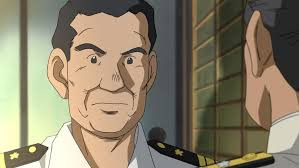
Tin-Tin eyes, ok?
-04/09/24
3 notes
·
View notes
Text
Post for 4/10
I’m kind of confused and a little disappointed after watching the new episodes of Zipang. It seems that the Mirai crew of Japanese soldiers from the 21st century initially did not intend to alter the real timeline. However, as time went on and as they came face to face with opposition, it seems like they ended up destroying quite a few American ships. More importantly, I thought that this anime would make a completely pacifist commentary on the war at first from viewing the first few episodes, as it originally seemed like Kusaka’s goal was nothing more than to help the Mirai crew achieve peace rather than to embrace the nationalist mindset of the past. While Kusaka did help achieve peace for Japan, the way that they did it was… interesting. Kusaka wanted a modified Japan that wasn’t like “old” or “new” Japan, but rather something in the middle (Zipang) that did not thoughtlessly go to war and did not surrender unconditionally or shamefully, thus necessitating the maintenance of an army. This approach was not quite what I expected at all and it appeals to Japanese conservatives in the sense that it imagines a version of Japan that still retains a military standing even after the war. In other words, Zipang does not imagine a Japan that dominated the war but it does still imagine a Japan that avoids nuclear disaster and preserves its stature and military might, of course, all without taking accountability for their actions. If my interpretation is correct, then I am disappointed in how it turned out. I wanted to like Kusaka because his story reminded me of that of Captain America, although I guess in reverse. Plus, his outfit was really cool. Anyway, I wish that this anime could have headed in a different direction.
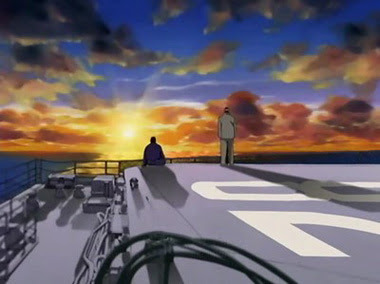
Image from http://anime.com/archive/Zipang/.
6 notes
·
View notes
Text
This anime does feel like a very explicit confrontation between the past and present. Old ways of thinking clash with the new. I find it especially interesting because so many other pieces of media cover themes that may relate to the war, but this anime directly focuses on events that occur (re-occur?) during it. I can't wait to give my presentation on it! :)
JVC Post #31
ZIPANG!
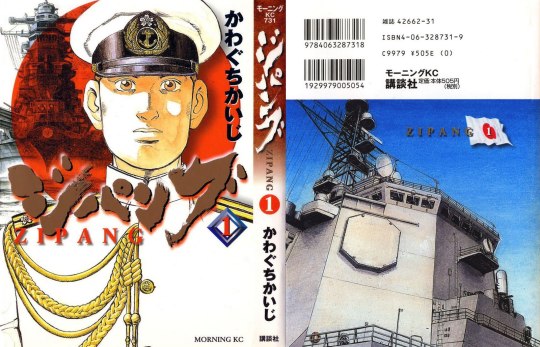
This show was really interesting. I really liked the intro and the outro too.
Can I just say that the premise of this show resembles an episode of The Twilight Zone? The entire time I was watching the first and third episodes, I was thinking "Rod Sterling would probably write a premise like this". It feels like the kind of story you'd find in a novel or a short story rather than an anime, and I find that intriguing.
The show allows modern Japanese soldiers to confront their past in a literal sense, both personally through the lieutenant and also by being transported to the Showa era in the middle of the war. While we've already seen many works that deal with World War 2, this one feels so much more direct. It feels like it's not only putting Japan's nationalistic, totalitarian past on full display, but it's connecting it directly to the modern audience through modern soldiers who struggle to reconcile their motivations with that past.
Kusaka feels like he will become a driving force in the narrative. His presence alone, just like the soldier said when he first boarded, changes everything. He is what anchors them to the era; Him and all his nationalistic pride, strictness, and hope for Japan's future power. It's why he's on the cover too. He's the symbol of Japan in that era.
When they finally arrive to Singapore and they're at the party/ball(?) Kusaka says that the wants to change the 21st century (something that is already happening, as he points out later). This is after he learns of the future peace in Japan and its lack of military power and whatnot. He wants Japan to be a militaristic superpower like the empire dreams of rather than the relatively peaceful country it eventually becomes. Obviously, the modern soldiers have a contrary opinion.
I feel like this is going to become a point of conflict as the plot thickens.
9 notes
·
View notes
Text
Post for 4/8
“Sexuality” by Saito had me wondering about otaku as a chicken-and-egg situation. Does one qualify as an otaku by learning the traits Saito mentioned, or is an otaku usually observed to have these traits? Anyway, I’m not sure whether I agree or disagree with Saito’s ideas toward the end regarding the idea that all otakus can keep their idolization and sexual desires of anime characters within the boundaries of aesthetic performance. It’s just hard for me to believe that the Miyazaki incident was the only one of its kind. Maybe I’m wrong – I don’t know.
Regarding “Media Effects” by Gauntlett, I actually hadn’t heard of the specific term “media effects model” before so I was a bit lost when I started reading it. But after searching it up, it immediately reminded me of the old discourse that “video games cause violence” that the media tried to propagate. Indeed, it’s quite a shocker that the intricate nature of human behavior cannot be reduced to some sensationalist headline.
In the first few episodes of Zipang, I wasn’t entirely sure if the anime was trying to glorify or denounce war. On one hand, the scenes of the Japanese army’s military routines, at least in the beginning, featured bright colors and uplifting music. The workers operated in satisfying harmony to carry out their duties. Even the sound effects of practice gunfire were seemingly suppressed. Finally, military officers showed compassion to others regardless of their alliance, as seen when Yosuke Kadomatsu saved Takumi Kusaka’s life and bore responsibility for his actions. On the other hand, the anime also makes it clear that it is not trying to come off as conservative propaganda. The question of “who were the bad guys?” is never answered because nobody is ever explicitly depicted as the “bad guys.” Furthermore, Kadomatsu tells the journalist that nobody in the army (during their time period) has experienced a war and they wish to avoid one. This sentiment contrasts with the national pride that Japanese nationalists attempt to uphold. Speaking of which, later in the anime, I found the premise of the imperial Japanese army clashing with the modern Japanese army to be highly interesting. Of course, in real life, it is common for Japanese people to have clear hindsight of their ancestors’ actions during the war and reflect on how ridiculous the views that were forced upon them were. However, in this anime that is basically the manifestation of a “what if” scenario, we see the reverse of that scenario in which someone from the past embraces contemporary Japanese views after modern Japanese people are miraculously transported into the past. Agreeing with contemporary ways of thinking, Kusaka says, “The work that I do here is not for the Imperial Navy. As with all of you, it is for the country Japan, and for the future to come.” I found this to be the most interesting line of dialogue in the show so far. Having someone from the imperial army whose mindsets were known to be heavily manipulated by the government be so empathetic toward a faction with a completely different way of thinking was a shocking thing to see, but I thought that the anime executed it pretty well nonetheless.
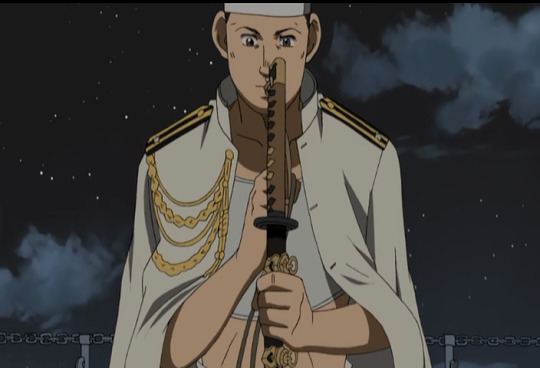
Image of Kusaka from https://www.imdb.com/title/tt0963150/.
2 notes
·
View notes
Text
Now that you bring it up, I wonder if the undoing of the stigmatization of "otaku" contributed to Satou's reluctance to come to terms with the real world. As you mentioned, the term was embraced by enthusiasts who felt that they belonged to a community, but I wonder if Satou's pride as a part of that community made his life stagnant. We see him make up excuses to other people as to why he wants to stay as a hikikomori and as far as I remember, he doesn't seem shameful of it at any point in public. Maybe he thought that once he found his identity in one space, it was too difficult to transition out of that space and to try new things.
1/5 Blog
I thought the anime “Welcome to the N.H.K” was interesting and explored relevant themes to today’s society like otaku subculture and escapism through anime, video games, etc. "Welcome to the N.H.K" is a thought-provoking anime adaptation that is based on the novel by Tatsuhiko Takimoto and offers a compelling narrative that resonates with today’s population on multiple levels. "Welcome to the N.H.K" follows the story of Tatsuhiro Satou, a young man who struggles with social withdrawal and conspiracy theories. Through his encounters with Misaki Nakahara, a girl on a mission to save him from his isolated existence, and his friend Yamazaki, an aspiring game designer, Satou's journey becomes an exploration of self-discovery and the pursuit of redemption. "Welcome to the N.H.K" offers valuable insights into the otaku subculture and the role of escapism in modern society. The term "otaku" refers to individuals with obsessive interests, particularly in anime, manga, video games, and other aspects of Japanese pop culture. While the term was once stigmatized, it has since been embraced by enthusiasts who find solace and community within the subculture. Within "Welcome to the N.H.K," the protagonist, Satou, embodies the characteristics of an otaku. He is deeply immersed in video games, anime, and internet culture, using them as a means of escaping from the challenges of the real world. Escapism, in the context of the series, refers to the tendency of individuals to retreat into fantasy worlds or virtual realities to avoid facing the difficulties of everyday life. For Satou and other characters in the series, their obsession with anime, video games, and internet forums serves as a coping mechanism for dealing with feelings of loneliness, inadequacy, and social anxiety. Instead of confronting their problems head-on, they immerse themselves in fictional worlds where they can feel a sense of belonging and control. The series portrays escapism not only as a form of entertainment but also as a double-edged sword. While indulging in fantasies may provide temporary relief from life's challenges, it can also exacerbate feelings of isolation and hinder personal growth. Satou's journey throughout the series involves coming to terms with his reliance on escapism and learning to face reality with courage.

3 notes
·
View notes